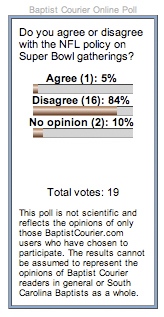Football fans are up in arms over a National Football League policy that allows bars to host Super Bowl parties but essentially prevents churches from doing so.
The policy prevents large groups from watching the game on anything larger than a 55-inch screen – which is too small for gatherings numbering in the hundreds. It also prohibits the Super Bowl from being shown in connection “with events that promote a message” – which is a major reason most churches host such parties. The policy applies to “mass out-of-home viewing,” which includes churches.
 Thank you for your interest in this poll at BaptistCourier.com. This poll was closed March 5, 2007.
Thank you for your interest in this poll at BaptistCourier.com. This poll was closed March 5, 2007.Mike Johnson, an attorney with the Alliance Defense Fund, told Baptist Press Feb. 1 a lawsuit against the NFL was possible, if a church is willing to take on the league. The league’s policy prohibiting promotion of the Christian message at large gatherings is blatantly unconstitutional, Johnson added. Another religious liberty legal organization, the Rutherford Institute, also sent out a press release saying it would be willing to defend churches.
The policy – which the NFL says is permissible under federal copyright law – came to light when the NFL pressured Fall Creek Baptist Church in Indianapolis into canceling its Super Bowl party. The church had planned on using a projector and a 12-foot screen. An Indianapolis Star story about the NFL’s pressure on the church resulted in more than 300 messages posted online – nearly all of them negative toward the NFL.
The Indianapolis Star published an editorial Feb. 2 saying the league “deserves a 15-yard penalty for unsportsmanlike conduct.”
“It was bad enough when NFL teams began holding cities hostage in demanding new stadiums. Now the league wants to dictate to churches the content of their own halftime shows. The NFL should be sent to the end of the bench for this fumble,” the editorial stated.
Bars and other establishments that regularly show sporting events are allowed to show the Super Bowl, according to NFL policy. But even with that legal explanation, fans disagree, with some of them calling the NFL greedy and money-hungry.
“This is a disgrace and a major black eye for the NFL,” one reader wrote on the Indianapolis Star website. “My former church had a youth group event that attracted 200-300 kids to watch the game together – it was a great fellowship opportunity, and it allowed the removal of potentially offensive material from the broadcast (go ahead – call it censorship – but the kids didn’t see the infamous wardrobe malfunction). What does the NFL have to lose by allowing these gatherings? … Shocking that, as always, the decision-making process comes down to dollars.”
The NFL contacted Fall Creek pastor John Newland, objecting to the use of the 12-foot screen as well as the church’s plans to promote the gospel.
“You admit … that part of the benefit of using our broadcast to host such an event is that it may allow you to bring your message of Christian values to non-congregants; i.e., you will be using the event to promote your church and its values,” NFL attorney Rachel Margolies wrote Newland. “While this may be a noble message, we are consistent in refusing the use of our game broadcasts in connection with events that promote a message, no matter the content.”
Stephen Davis, executive director of the State Convention of Baptists in Indiana, told Baptist Press that Newland had handled the situation “with integrity, respect and discretion.”
“We are investigating how our 440 Southern Baptist churches across Indiana can utilize the Super Bowl event in the future without violating NFL rules,” Davis said. “As always, we strive to be responsible citizens, respecting the governing rules and authorities.”
Rutherford Institute president John Whitehead said attorneys for his organization sent a letter to NFL officials condemning the league’s effort to stop church parties.
“Surely the NFL can find something better to do than pick on small churches wanting to gather together and cheer on their Super Bowl teams,” he said in a statement. “These churches have a constitutional right to assemble their congregants, and it shouldn’t matter whether these people are gathering to protest the war, pray for the nation or watch a football game. If the NFL has no objection to alcohol-laden viewing parties at sports bars, it makes no sense that they would object to football fans gathering at more wholesome family-oriented events to support their teams.”
Fans can contact the NFL’s New York office at 212-450-2000. The commissioner is Roger Goodell.